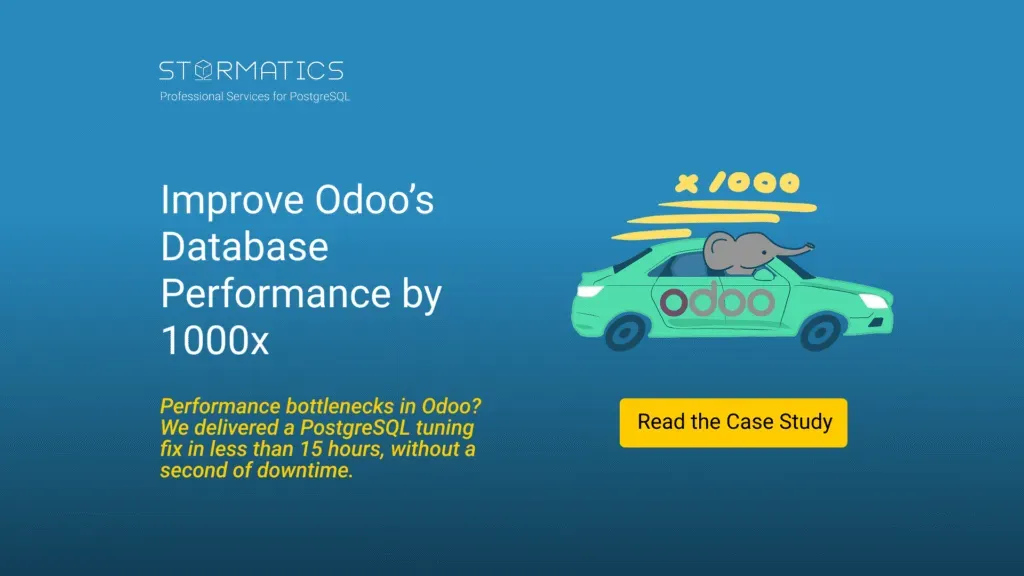Solving Odoo CRM Slowdowns with PostgreSQL Tuning: 1,000x Faster Reporting
When your business depends on Odoo CRM and starts to slow down, operations suffer. That is precisely what happened to a fast-growing delivery company that relied on speed, both on the streets and in the back office. As their customer base grew, load times for key CRM screens ballooned to five minutes, reports stalled, and internal workflows were disrupted. Their application looked fine. But the problem, like in many scaling Odoo deployments, was deeper: unoptimized PostgreSQL.
In just 15 hours, targeted PostgreSQL tuning improved 75 slow queries by up to 1,000x. Here is how we did it, and how it could apply to your setup, too.
Odoo CRM Performance Bottlenecks at Scale
As the delivery app’s customer base and order volumes grew, their Odoo CRM, once reliable, began to slow down. Key workflows, such as customer lookup, order status updates, and reporting, took anywhere from one to five minutes to load. For a company that relies on real-time coordination among riders, support, and dispatch, those delays meant stalled deliveries, frustrated agents, and reporting that fell hours behind schedule.
The Business Impact: Performance Affecting Operations
The slowdown was no longer a minor nuisance; it became a business risk. Delivery coordination suffered, with reporting backlogs piling up, and support teams struggled to access customer data promptly. Internal firefighting became the norm. Without intervention, these issues would have cost them customer trust and operational efficiency.
That is when they brought us in.
Why Your Technical Team Should Leverage PostgreSQL
Your Odoo CRM is only as fast and stable as the PostgreSQL database powering it. As your business scales, that database can quietly become a bottleneck, especially when data volumes grow faster than your team’s ability to tune the system. Most development teams excel at building features, but PostgreSQL optimization requires a distinct skill set. Left untuned, it leads to degraded performance, frustrated users, and operational delays that cost you time and money. When this client came to us, they faced all of the above. But with the right expertise applied in the right places, we resolved the issue without rewriting their application or disrupting operations. That is the kind of targeted PostgreSQL support that keeps growing businesses running smoothly.
Download the Full Breakdown as a PDF
Initial Diagnosis
There was a significant slowdown in PostgreSQL queries when the system was under load. After a thorough examination of their database queries, a table with 74 million rows was identified as the reason for poor database performance. To address these issues, Stormatics employed the “pg_stat_statements” extension to gather metrics for the database.
Fixes Implemented by Stormatics
Database Parameter Tuning
The first step was to verify whether PostgreSQL’s configuration aligned with the infrastructure being used. With premium SSDs being used for the system, we were able to significantly lower the cost estimates for random page access. This, in turn, encouraged PostgreSQL’s query planner to prefer index scans over sequential scans, thereby improving the performance of 75 queries by 1,000x.
Vacuum
With several tables comprising over 40 million rows being frequently updated, table bloat was a real problem in the database. We noticed more than 3 million dead tuples being accumulated week over week, contributing significantly to the sluggish performance of the database. Optimizing autovacuum to both remove the dead tuples and update statistics in the database enabled us to reduce query costs by more than 60%.
Query Tuning
Effective indexing is the cornerstone of query performance optimization. Indexes expedite the data retrieval process by pinpointing the exact pages needed for a query, thereby reducing input/output (IO) operations. After careful query analysis, we recommended strategic indexes to be placed to get the balance between speed and space. This got us a performance boost of 415x for select queries.
The Results: 1,000x Faster in Just 15 Hours
In total, Stormatics delivered targeted PostgreSQL tuning that improved 75 of the system’s slowest queries by up to 1,000x, all within just 15 hours of consulting time. The improvements stabilized the database under heavy workloads, eliminated reporting delays, and allowed the client’s delivery operations to run at full speed without further disruptions.
What This Means for Scaling Odoo
Odoo runs on PostgreSQL. That means your system’s long-term performance depends on how well your database is tuned as your business scales. Left unchecked, growing data complexity will eventually slow down even the most carefully built Odoo deployments. Proactive PostgreSQL audits and tuning, like the work we performed here, don’t just fix current issues; they prevent future bottlenecks before they impact your operations. For businesses that rely on Odoo, this kind of specialized expertise keeps growth on track without risking stability or uptime.




